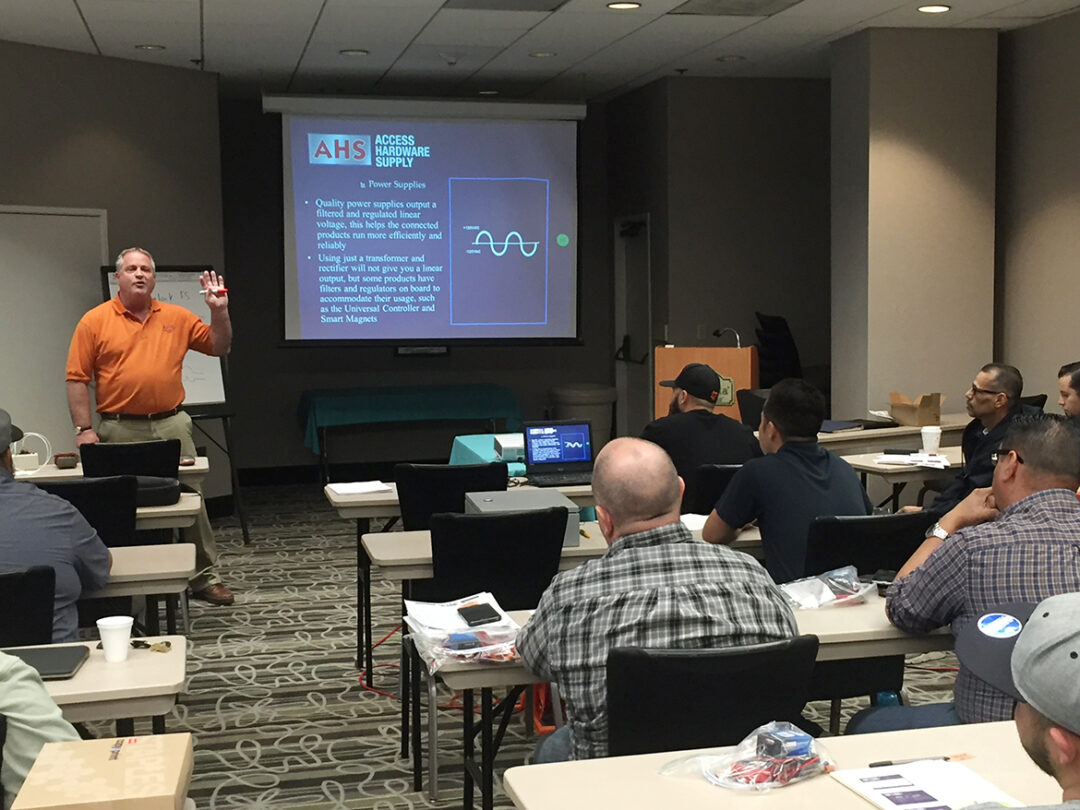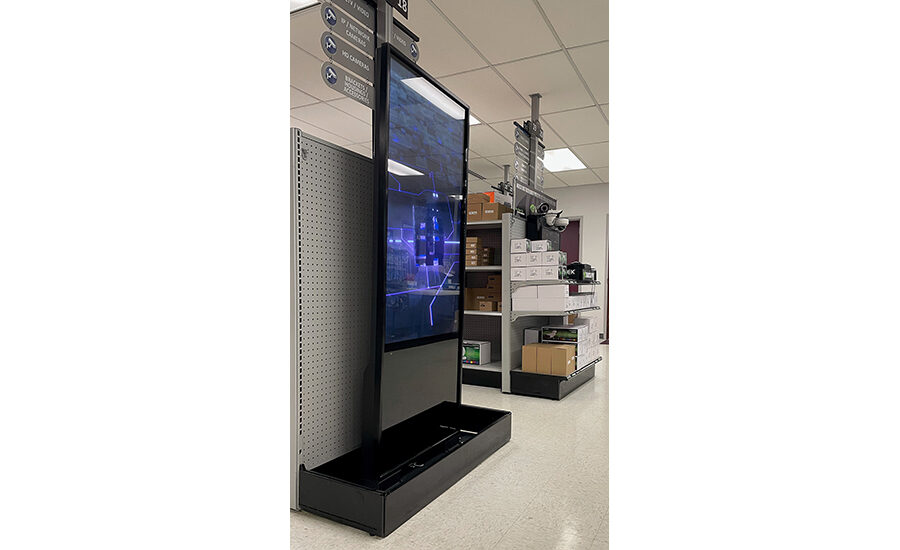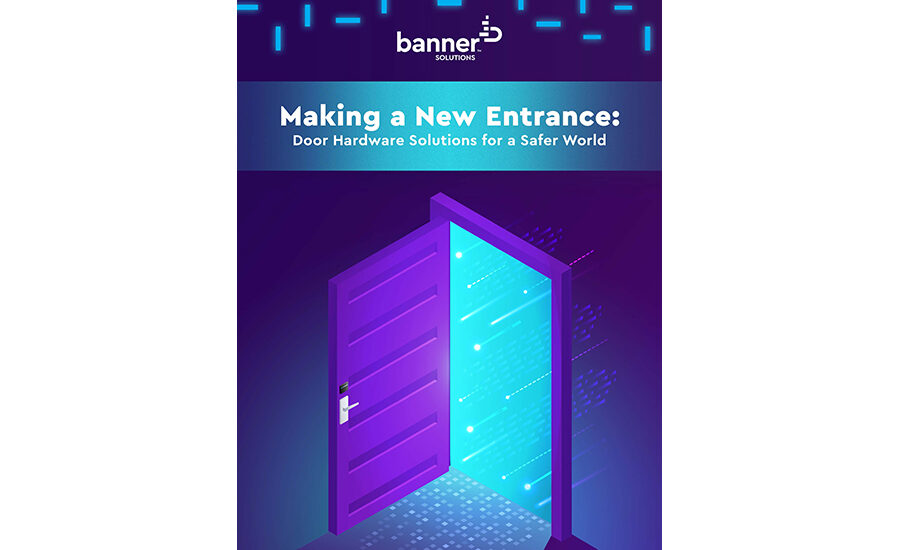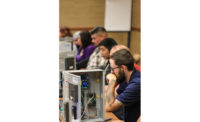When the COVID-19 pandemic drove people nationwide to isolate themselves and curtail travel, security dealer training largely went digital. Now that the pandemic is waning, will the shift toward digital be a permanent change? Or will we see a surge in in-person training?
We asked four security distributors about this and about any new training options they’ve introduced over the last year or so — and we got a wide range of responses.
New Training Content
COVID-19 also has driven distributors to rethink training content.
Glenn Siegman of Banner Solutions notes, for example, that customers are looking for touchless access control products. Recognizing this, Banner Solutions partnered with three major door hardware manufacturers and produced a 14-page white paper titled “Making a New Entrance” that according to Siegman is very in-depth about the future direction of touchless solutions.
Banner Solutions also updated its 68-page access control manual to include more information about how to install touchless offerings.
Anthony Berticelli of PSA Security Network notes that with everyone doing things virtually, COVID-19 also raised awareness about cybersecurity. That, in turn, helped drive a new initiative at PSA to establish a security industry cybersecurity certification program.
“[The idea is] to create a baseline for knowledge and skill and understanding level for people installing equipment in the security industry,” he explains.
PSA hopes to have an exam ready to launch this fall. The expectation is that people with proper on-the-job knowledge would be able to pass the test with little or no additional study. But a prep course will likely be offered as well. That course may be available in an online format but also may be offered at trade shows.
In-Person Training is ‘In’ Again
“Customers are craving human interaction,” observes Brian Avants, Western regional sales manager for San Leandro, Calif.-based Access Hardware Supply, which specializes in access control, door hardware and related equipment.
As a result, Access Hardware Supply has begun to offer in-person classes that have drawn as many as 50 or 100 attendees — although the company continues to offer training via Zoom teleconferencing as an option.
Avants adds that customers’ increased interest in human interaction is great news for salespeople because, as he puts it, “When you show up, they say ‘Come on in.’”
Tony Torres, marketing manager for Security Equipment Supply, a security equipment distributor headquartered in Earth City, Mo., also sees customers asking for in-person training. He believes some customers have experienced “webinar burnout” and notes that customers like classes that provide training on a panel, after which the customers get to keep the panels. Customers also like the hands-on aspect of in-person training and like being able to ask questions, he says.
That doesn’t mean customers have lost interest in digital training options, however.
SES has installed touch-screen kiosks in several of its locations for training purposes. The kiosks have informational videos from 30 vendors that customers can watch to learn more about technology, products and the like.
The kiosks are cloud-based, making them easy to update, and can be viewed by a single individual or a small group. SES plans to install them company-wide.
To encourage customers to use digital training, SES also has started doing promotions with vendors that have libraries of digital training materials that Torres calls “training universities.” A recent promotion enabled dealers to get a free doorbell or regular camera after taking 25 short classes lasting five to 15 minutes each, explains Al Kasishke, marketing coordinator for SES.
Supply Chain Delays
Security equipment distributors are on the front lines when it comes to the supply chain delays that have impacted the industry in recent months. SDM asked distributors interviewed for this story how they’re coping with the situation.
“We’re seeing delays from every major manufacturer,” says Brian Avants of Access Hardware Supply. Avants attributes the delays, in part, to the increasingly global nature of security equipment manufacturing.
“Thirty years ago, the entire lock was made in one factory; now it’s made all over the world,” he says. “If you’re short on parts from one place, you can’t make a lock.”
Access Hardware Supply has used a combination of strategies to cope with product delays, including holding a larger inventory of certain products than in the past and, in some cases, recommending an alternative product when the product that a customer requests isn’t available.
When a product that has been on back order hits the shelves, “It’s gone,” observes Tony Torres of Security Equipment Supply.
SES works with vendors to try to get ahead of the game, Torres says. But, as SES’s Al Kasishke notes, if a product is on back order for several months, SES salespeople are well trained to find an alternative solution in the price range.
“There are definitely supply chain delays,” says Anthony Berticelli of PSA Network. “Some manufacturers are having material shortages or shipping delays. Some are fine on equipment but are now having development delays.”
Some companies are understaffed, which also contributes to the problem. “The people side is having as big an impact as equipment on the delay side,” Berticelli explains. People issues, he notes, impact the manufacturing and the shipping side.
Unfortunately, some products that in the past would have taken a week to get are now taking 12-16 weeks, he notes. That reality makes communication with security dealers key, he notes.
“The most important thing we can do is communicate — a lot and effectively,” he says. “We’re the channel between integrators and manufacturers. If we can gather information from manufacturers and pass it on, we’re doing that. We just have to be honest. We shouldn’t sugar coat things.”
A Different View
Anthony Berticelli, vice president of operations for Westminster, Colo.-based PSA Security Network, has a bit different view on how the COVID-19 pandemic has impacted training.
The requirement to socially isolate and use digital training during the pandemic showed the importance of time in the field or office as opposed to being out for events, Berticelli says. That reality, combined with the high cost of travel today, has driven some dealer/integrators to change their approach to training.
“Anything that can be done from a virtual perspective, people are taking advantage of that,” he observes.
PSA may be best known as a nationwide network of security dealer/integrators but it’s also a virtual (i.e. non-stocking) distributor, and it puts out an average of 23 new pieces of educational content each month, according to Berticelli.
Berticelli believes security industry training would have trended toward virtual even without COVID-19 but the virus hastened that trend.
Like others interviewed for this story, he says security dealers like to have equipment in front of them when they are trained on it. But he adds that preference can be easily accommodated by shipping products to the dealers in advance of training.
The products can then be used for future people to train on, and, in some cases, may be installed in the field.
PSA hasn’t gone totally digital, however. The company’s most recent PSA TEC, traditionally an annual in-person event, was a hybrid event.
“A significant portion was virtual,” Berticelli explains, and virtual attendance was higher than in-person attendance.
Yet another view comes from Glenn Siegman, marketing manager for electronic access control and residential products hardware at Chicago-based access control wholesale distributor Banner Solutions.
Siegman recommends that security dealers determine the best training option based on the number of people who need training.
“Virtual is a good scenario for a smaller group of six to 10 people,” Siegman says. “If you have 15 to 20, a physical training program will be much more effective from the standpoint of interaction, visualization and product demonstrations.
“I think everybody would prefer that everything would go back to the way it was,” he says. “For now, it depends on the size of the group and how in-depth the training is.”
Clearly, the COVID-19 pandemic has had a big impact on security industry training — and while some people within the industry will welcome the return of in-person options, virtual training seems to have gained a strong foothold that the industry appears unlikely to abandon as the pandemic wanes.






